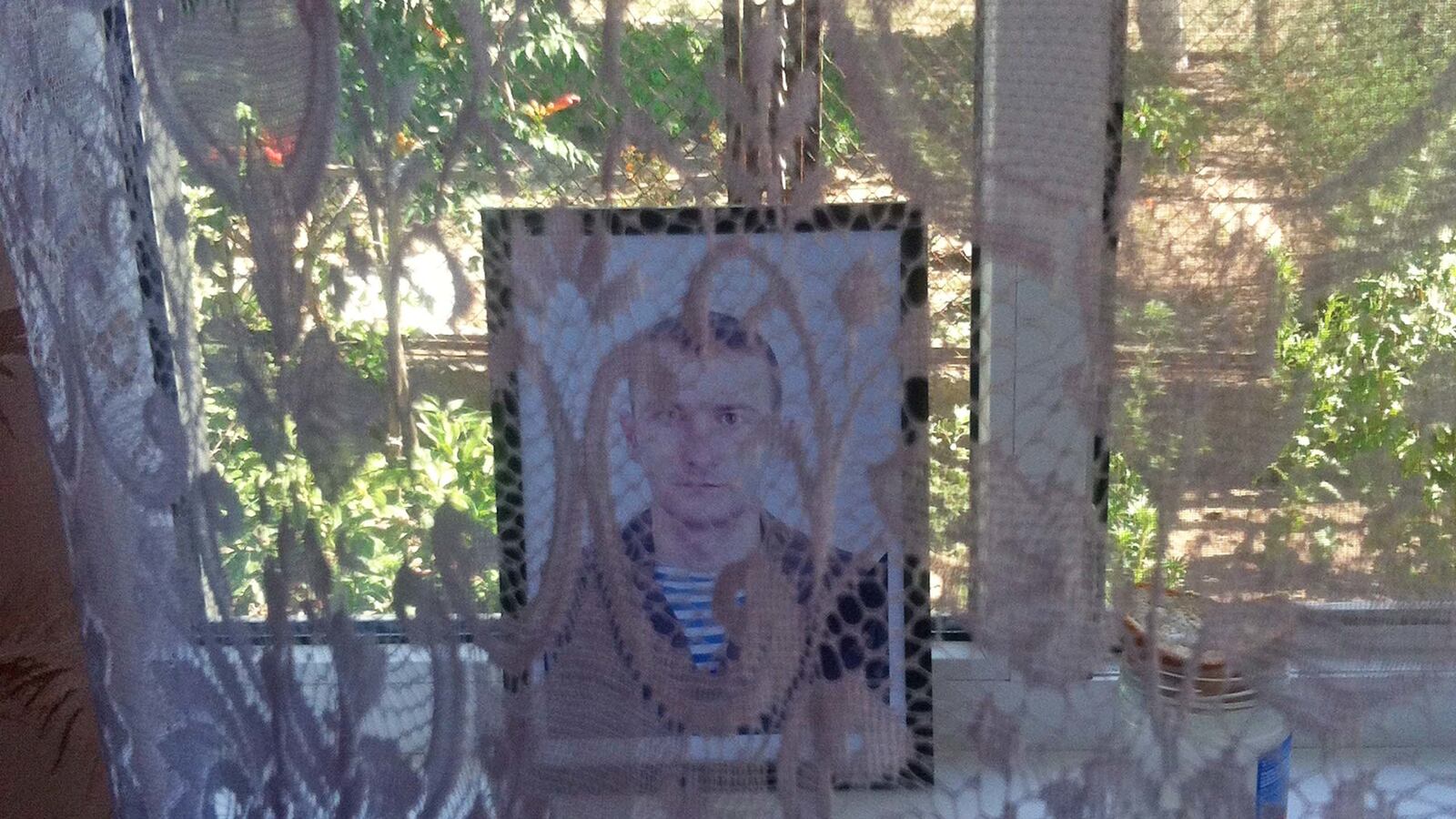NIKOLAYEV, Ukraine — The wind moved the transparent tulle curtain on the window of a one- floor village house on a street called Peaceful Avenue. The family put Alexander Kucherenko’s portrait in a black frame on the windowsill, behind the curtain, so his two children age 8 and 4 would not constantly ask their brokenhearted mother and grandmother who killed their dad and why. The house in Kapustino, on the outskirts of the town of Nikolayev, filled up with people coming to share a meal and have a drink with the family in memory of their good friend Sasha.
Sasha’s mother and wife, both named Tatyana, covered their hair with black scarves and often moaned in pain as they told visitors on Thursday that the 32-year-old Ukrainian had been killed by a Russian Grad rocket in Dyakovo, in the troubled eastern part of the country on the border with Russia. Shrapnel from a rocket ripped into Kucherenko’s chest and tore through his liver. His body had caught the impact, sparing the lives of two of his friends. Kucherenko’s last words were: “I don’t feel pain, leave me alone.”
But his family feels the pain. They blame “aggressor Russia” for Sasha’s death, and that they also blame Ukraine’s leadership and its President Petro Poroshenko for not saving his life.
This week the Kucherenkos were not the only angry women in the city of Nikolayev, home to the 79th Paratroop Brigade’s military base in southern Ukraine. The city was flooded with gloomy army officers and military vehicles as the rumor circulated that the Russian army is re-enforcing its troops across the frontier less than 200 kilometers away from the city.

Nikolayev has had funeral after funeral this week, sometimes several in a day. Two months ago at least 1,600 soldiers of the 79th brigade “were thrown up to be the fodder for Russian cannons,” Kucherenko’s mother told The Daily Beast. “Hundreds of our boys hide in trenches under constant Grad rocket fire coming from Russia; all they have for food is buckwheat or snakes that they catch,” she said. “We want to know why Poroshenko is not sending them any military help. Please save the 79th Brigade, so there would be no more mothers like me, left without their sons.”
In an interview with the Daily Beast on Thursday, the vice governor of Nikolayev, Oksana Yanyshevskaya, said that some of the brigade’s units were “trapped” last month, while fighting defensive operations along over 70 kilometers of Ukrainian border. At least 21 of them have come back in coffins, and Nikolayev’s military hospital is struggling to save the lives of 73 badly wounded paratroopers. “Russians fire Grad rockets from across the border at our units, who are stuck in Dyakovo, a small place on the border with Russia. Our military cannot fire back at they Russians, because that would be a good reason for [Russian President Vladimir] Putin to immediately invade Ukraine,” the vice governor explained. “The most painful part of my job today,” she said, “is to face their families and the wounded soldiers coming back home.”
Nikolayev’s women are determined to save the lives of their surviving boys if they can. Since last Friday, over one hundred angry wives and mothers of the trapped soldiers have been blocking the major highway outside Nikolayev and protesting in front of the main government building demanding that the country’s leadership provide some military support for the units in Dyakovo. About 20 women went to Kiev earlier this week for a meeting with President Poroshenko; but their meeting, scheduled for Thursday afternoon, got cancelled.
These women know all too much about what is really happening to the 79 th Brigade on the Russian border: they speak with their husbands and sons on the phone several times a day. The women I talked to as they gathered outside the regional governor’s offices claim that there are at least 50 more dead bodies waiting to be recovered from Dyakovo.
“Look, all they have there is these three burned trucks; and here is the trench they’ve been living in for a month,” said Mariya Bershatskaya, showing photographs that her husband Sergei had sent her from the frontline. She, too, said the boys had been eating snakes. Another angry protester spoke up: “Poroshenko publically said that he would provide support for our guys but that is not true; our boys were witnesses to mass murder [of their comrades by Russian attacks]. My fear is that nobody in Kiev is really interested in their survival,” said Ekaterina Klishena.
Earlier that day one of the visitors payer her respects at the Kucherenko house could not stop crying. Tatyana Mikhailova, a 20-year-old woman with pretty blonde hair and a face that must have been very fresh and joyful not very long ago, said she lived with her cell phone in her hand, waiting every moment for her husband’s call. Only two days after their wedding last May, Mikhailova went from being “the happiest woman in the world to the most horrified one,” she said. Two days and two nights was all Tatyana and her husband Aleksander had for their honeymoon before the 79th Brigade called him back to the front line.
When her neighbor and friend Sasha Kucherenko came back in a coffin, Mikhailova decided to join the women’s protests on the highway. “My [Aleksander] is Russian by his roots but he is a Ukrainian patriot, he will not desert the army,” Mikhailova said, covering here tear-streaked face with a handkerchief. “Sometimes when we talk on the phone, he sounds desperate. He does not understand and neither do I why his commanders do not order them to fire back at Russian and pro-Russian forces.”






